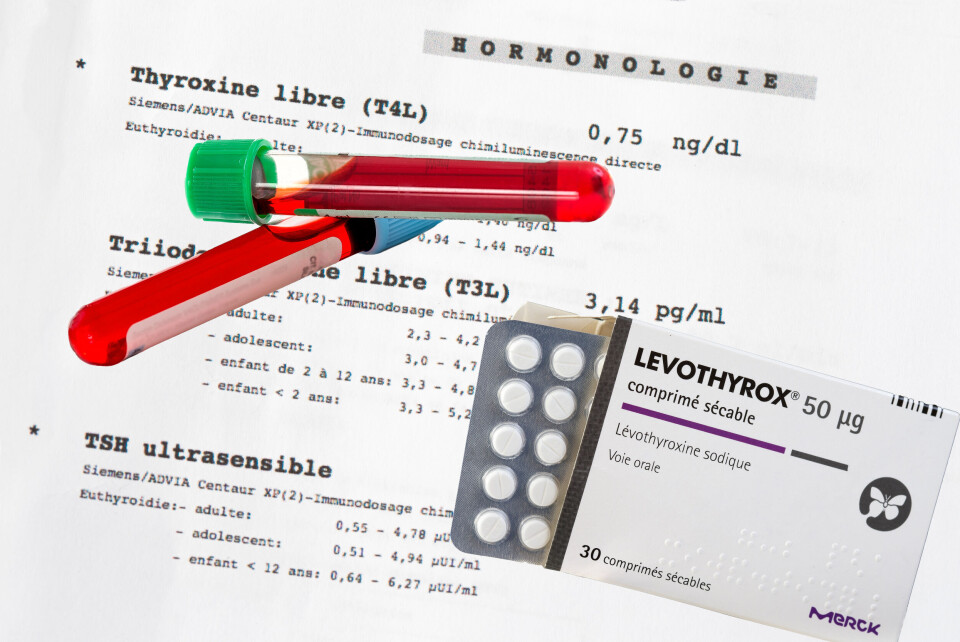-
Roadside noise cameras await approval to start issuing fines for loud vehicles in France
The devices known as meduses already exist in several cities but so far have only been ‘instructional’
-
White storks make strong return in France via nest ‘platforms’ and clipped wings
The Ligue pour la Protection des Oiseaux shares the conservation challenges in saving these birds from extinction
-
Hosting scheme in south-west France lets newcomers sample lifestyle
Households in nine Dordogne communes volunteer under Mes Nouveaux Voisins scheme
Levothyrox controversy: Lyon court wins payout for patients
The manufacturer of thyroid drug Levothyrox, which has been at the centre of controversy since 2017 after patients claimed a new formula did not work, has been ordered to pay €1,000 to more than 3,000 plaintiffs.

Pharmaceutical company Merck, which makes Levothyrox, was ordered to make the payments by the Court of Appeal in Lyon.
Lawyer for the patients, Christophe Lèguevaques, announced this week (June 25) that the court had recognised that Merck committed “an error” when changing its treatment, and had ordered the company to pay €1,000 to each of the plaintiffs - a bill amounting to more than €3 million for the US-based firm.
He said: “The court considers that there was a moral injury suffered by all parties."
The case in Lyon, which was first brought by more than 4,000 patients, was initially thrown out after judges said Merck had no case to answer on the launch of its “new formula” of Levothyrox in 2017.
Read more: French Levothyrox case forced to open in concert hall
Read more: Lyon court dismisses controversial Levothyrox case
After this, around 800 patients dropped the case, but the remaining 3,329 patients brought an appeal, maintaining that they had suffered side-effects and serious medical issues due to the change in the formula.
They had initially claimed 10,000 in compensation each - which would have amounted to a bill of €33 million in total for Merck.
Drug controversy
Controversy erupted over the medication in summer 2017, after Merck launched a “new formula” of the drug. Thousands of patients claimed that they had seen a return of negative symptoms after taking the new drug, and some even alleged that their thyroid cancers had returned due to the new drug not working as effectively as the old one.
More than one death has also been associated with the case, seeing an allegation of manslaughter brought against Merck.
Read more: French Levothyrox inquiry now includes manslaughter
In October 2017, then-French health minister Agnes Buzyn ordered 130,000 boxes of the old formula nationwide, half of which sold out within two days, and a helpline number was set up for patients.
Read more: Minister brings back old Levothyrox as crisis grows
Read more: Almost half of Levothyrox stocks sold in two days
Read more: Levothyrox helpline for concerned thyroid patients
Patient advocate groups launched multiple court cases against the manufacturer.
But Merck has always maintained that its new formula is “bioequivalent (medically identical)” to the old one, and that only non-active ingredients of the drug were changed, to conform to new medication rules from medical safety agency l'Agence Nationale de Sécurité du Médicament (ANSM).
ANSM itself conducted its own independent analysis of the drug and found it to be “good quality”.
A later, separate, French-UK study found that the drug was in fact “not equivalent”, and concluded that 60% of patients prescribed the drugs “may not react” in the same way to both formulas, and that the new medicine may not be equally absorbed by everyone.
Related stories
New France-UK study finds Levothyrox ‘not equivalent’
French senator calls for new inquiry into Levothyrox
French agency confirms ‘good quality’ of Levothyrox
Calls for health minister to go amid new thyroid study
Stay informed:
Sign up to our free weekly e-newsletter
Subscribe to access all our online articles and receive our printed monthly newspaper The Connexion at your home. News analysis, features and practical help for English-speakers in France
























